Sophia McDermott
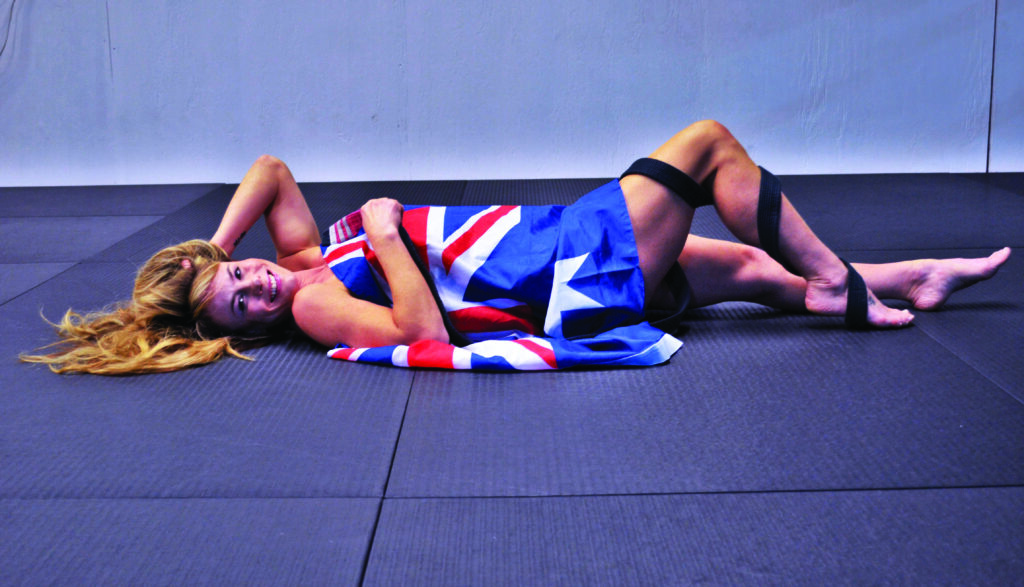
By Evelyn Sutton
Photos By Lindsay Conley, Unforgettable Images
Australia’s first woman BJJ black belt World Champion is on mission to demolish archaic patriarchal structures in Brazilian Jiu-Jitsu and in society. Her life’s journey has brought her to this very moment. She reminds us to speak up. Be strong. Be powerful. Be a woman.
When you meet the vibrant and confident Sophia McDermott, you can’t imagine how arduous her journey to the top of the Brazilian Jiu-Jitsu podium was and the many challenges she had to overcome to get there. A spectacular example of sheer tenacity, talent and determination, Sophia hails from a time when the male predominant sport of Brazilian Jiu-Jitsu was dominated by a wolf pack culture where female athletes were very low in quantity and relevance.
“I’ve been in this sport for quite a long time and when I started, it was all about the male wolf pack. If you were a female athlete, you could only be one of two things. One of the boys, in which case you had to prove yourself to be one of them and be lumped in their hierarchy. Or, you were completely ostracized, most likely as just a sex object, and never be taken seriously as an athlete.”
“The choice I made was to be part of the pack, subjugating my femininity. I became one of the boys. It was easier that way because dealing with the sexual harassment was pretty tough”, she reveals.
Today, Sophia is regarded as one of the top female grappling competitors of all time and a top-notch professor who inspires and trains people in BJJ and fitness worldwide. Despite the lack of support, the long days on the road away from her family and many sacrifices, Sophia McDermott went on to become a World Champion and Australia’s first female Brazilian Jiu-Jitsu black-belt.
“I would tell myself, I want to be Australia’s first woman BJJ black belt. I want to be a World Champion. I kept showing up, I kept training and plugging away. I put my head down and focused on my goals. I dealt with every adversity and came out stronger.”
The Road Less Traveled
Brazilian Jiu-Jitsu wasn’t something women did back then. For the most part, women weren’t encouraged to participate and parents wouldn’t think about enrolling their daughters in such a “dangerous sport”. BJJ was for men and boys. Women who dared to compete in it knew they weren’t going to receive the same amount of support and attention as their male counterparts.
Sophia was no different. Despite her innate athletic aptitude and physical conditioning from her years as a gymnast, her arrival at the Jiu-Jitsu competition circuit was met with resistance. Her self-imposed demands for perfection would also get the best of her at times. “I wanted to be the best that I could be. I was not a good competitor. Right before a match, I would tend to freeze up because I put so much pressure on myself.”
She had to work twice as hard to earn respect. In fact, she believes, in the beginning, she suffered double discrimination for being a woman and not being Brazilian. It played a major part in her feeling ostracized. “Besides the challenges of being one of the few females in the BJJ competition scene, I also had to deal with politics and favoritism because I was a ‘gringo’. I didn’t fit. For me to win, I literally had to break my opponents. It was hard to get the recognition I deserved. If I lose because my opponent was legitimately better, that’s cool, I get it. But I cannot tolerate losing a match because my points were switched. That’s the reason I learned Portuguese. I realized I needed to speak in Portuguese to the referees so I would understand what they were saying, be more accepted in their eyes and actually get the points I earned. I have never fit. I’m an absolute Jiu-Jitsu rebel. I’ve embraced that.”
After a series of successful wins, Sophia moved from Australia to Las Vegas seeking a higher level of training and to pursue a career in Jiu-Jitsu.
In Vegas, Sophia joined Robert Drysdale‘s prestigious gym where she went on to become one of their most celebrated black-belts. Sophia and Robert started dating and eventually got married. Nowadays, no longer a couple, they remain friends and share custody of their daughters.
Not everything in her journey was a struggle. There was also a lot of joy and beauty along the way.
“I was a gymnast, extremely disciplined. I trained very, very seriously, every day. My childhood was militant and structured. I was the child that didn’t go to birthday parties because I had to train. I was that child and it was all my choice, an insatiable drive from within pushed me forward.”
“My career was cut short at 21 years old due to a severe broken shoulder. The injury was on the growth plate. Basically, it wouldn’t heal until I stopped growing. My immediate goal was to find something as physically and mentally challenging as gymnastics. I was introduced to Brazilian Jiu-Jitsu by my boyfriend. My first thought was, I’m not going to roll around with all these sweaty dudes in pajamas.”
“I had my first session, and fell in love with it. I remember being on top, beating the crap out of a guy, he couldn’t push me off. This is amazing, I thought. I found what I’ve been looking for. That night, I made a declaration to my family that I found this weird sport and I was going to be the first Aussie female to get a black belt in it. They looked at me like a had grown another head.”
“I trained as much as I could and started competing. I was winning. It felt good. The more I won, the more I wanted. I decided to go overseas and give international tournaments a try. I started winning there too. I was hooked.”
Sophia also participated in Ms Figure tournaments and won the title of Overall Unlimited Champion in the “Figure” category for the NPC federation.
Empowering Women
Girls on Top is the realization of a dream from long ago. Amidst the chaos of 2020, Sophia saw an opportunity to finally launch the online program she had been dreaming of, as train-at-home resources became an urgent need.
The response from the female BJJ community was immediate and enthusiastic. Jiujiteiras all around the world now had access, from the safety of their homes, to women specific training videos, one-on-one coaching sessions and even a training partner, Barry, a BJJ dummy custom designed for women.
Women are biologically wired to be nurturers. That can be hard for some to overcome in the early white-belt days of their training. They find it hard to apply the pressure needed and to engage in the form of combat that is Jiu-Jitsu. “Having a Barry can help. It makes it easier for women to psychologically work through the hang ups and bring forth positive aggression.”
“For me, 2020 was actually one of the best years of my life. It was the birth of Girls on Top. It was interesting that a pandemic had to happen for my business to be realized.”
Sophia wants to continue to improve her program and reach more women. “I’m working on developing new strategies and building up Girls on Top. I’m setting goals for growing the business, being an empowered woman as well as raising my children as a single mother.”
During her most recent tour in the United States she visited several gyms, and spent some time in Florida during the weekend IBJJF Masters World took place. “I love traveling and teaching. When I’m on the road, I’m meeting new people, and it was good for me to do that. As most, I was on lockdown for a while. It was good to be able to get out again and do what I love.”
There’s a recurring and underlying theme in everything Sophia does, and that is empowerment. “It has always been about empowering women. I was going crazy during the lockdown, not being able to go to the gym. I kept thinking about the ladies who were feeling extremely isolated and alone. That for me was a driving force. I wanted to be able to be there for the ladies that didn’t have outside support. To help them not just with their Jiu-Jitsu training but also with health and fitness.”
Girls on Top offers empowerment, education, provides women specific Jiu-Jitsu and a community that helps women feel part of something greater.
“Even if you’re training at a BJJ gym, Girls on Top is still a valuable resource capable of taking your Jiu-Jitsu to the next level”, she explains. “Maybe you’re the only female at your gym and not able to train with other girls. There’s a feeling of isolation, a feeling you can’t move forward in your techniques because you’re getting crashed by big guys.”
The majority of instructors teaching Brazilian Jiu-Jitsu are male. Most of them mean well and are great coaches. You will learn a lot from them. However, they are going to be sharing techniques that in general work better for men, because that’s their personal experience and the majority of people in the class are men.
“Women deal with things men don’t have to deal with. And we don’t move the same way. Certain factors that are important for women to work on in their technique are not going to be on a man’s radar. Some of the main lessons I teach are based on Jiu-Jitsu scenarios and situations that happen to women much more frequently than men. I provide solutions that are more pertinent to female bodies.”
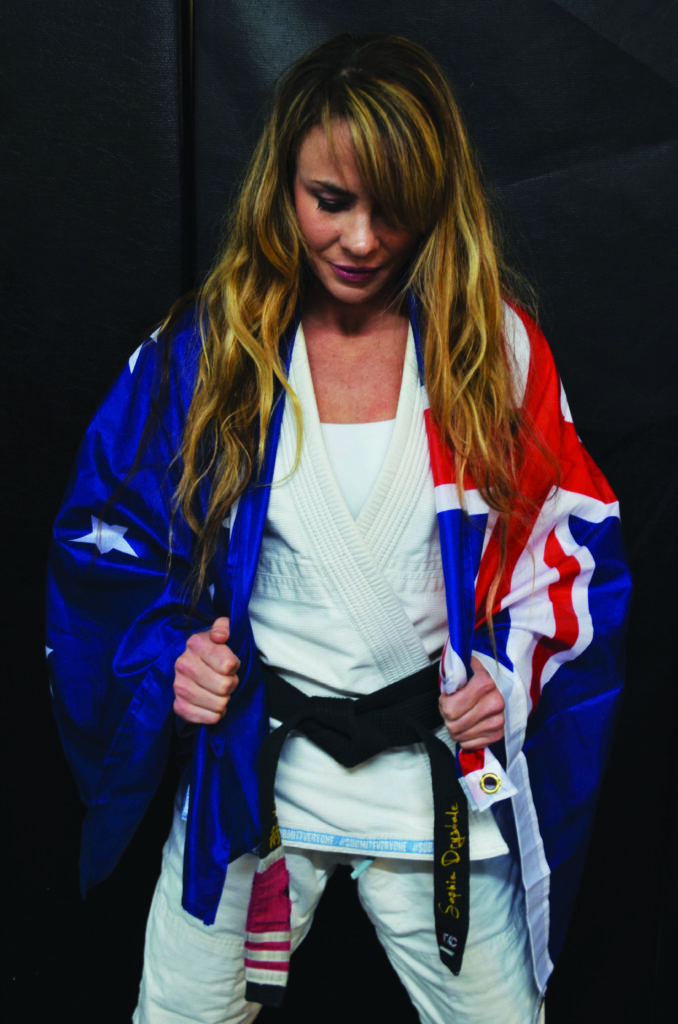
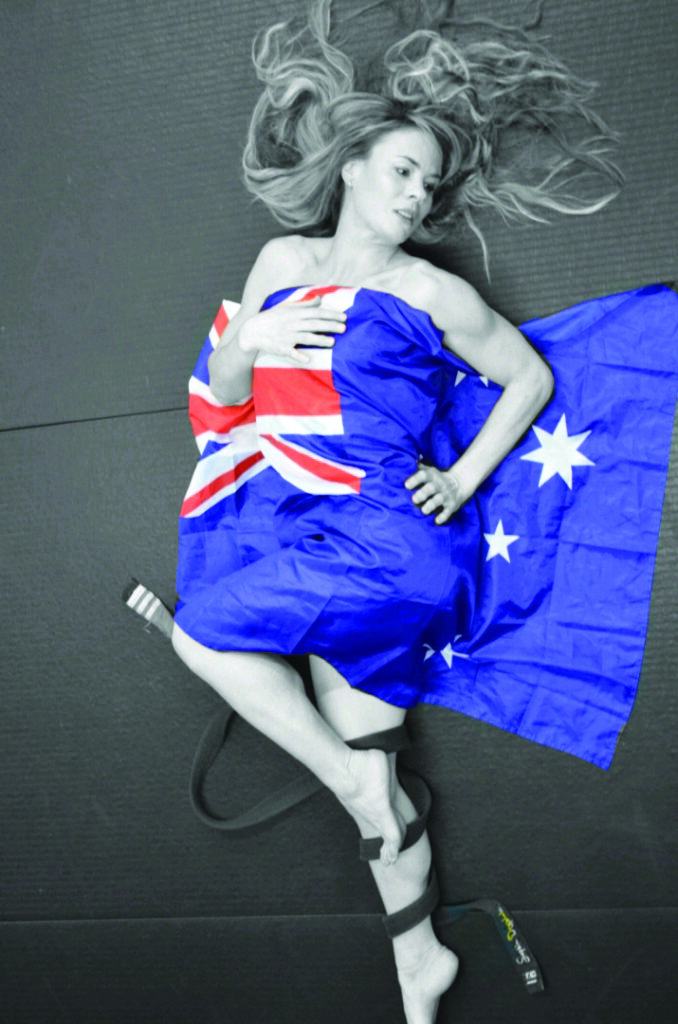
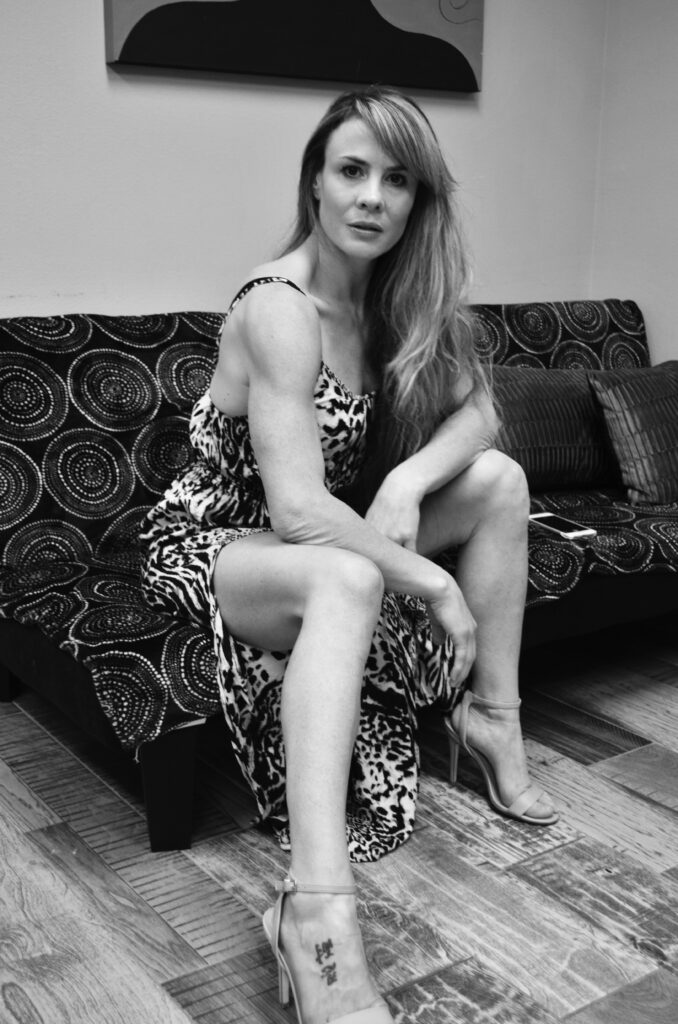
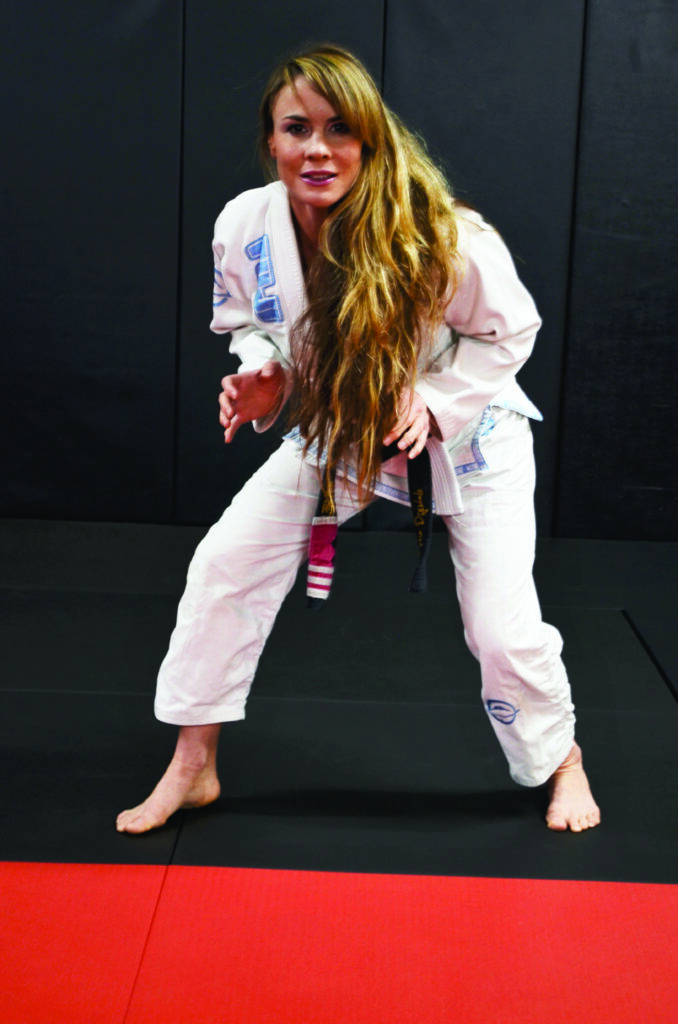
“I would tell myself, I want to be Australia’s first woman BJJ black belt. I want to be a World Champion. I kept showing up, I kept training and plugging away. I put my head down and focused on my goals. I dealt with every adversity and came out stronger.”
Sophia McDermott
The Fall of Patriarchy
The empowerment of women and fall of the patriarchy is a mission Sophia takes to heart. “I personally have dealt with or seen everything that could possibly happen to women in Jiu-Jitsu. Nowadays, I go online and read about what women are still dealing with. Sexism, harassment, ostracism, and wolf pack mentality, still exists. There’s a couple of women’s BJJ Facebook groups that are really open about sharing this stuff. I go through their comments and I’m like; yep, yep, yep. It’s happened to me.”
It’s not all gloomy in BJJ. There is hope on the horizon. Thanks to the sacrifices of pioneer female athletes and male coaches who helped open the doors and dedicated their time and effort to training women, we have a much higher level of recognition and respect in the sport today than 25 years ago.
The rise of women and the demise of patriarchy continues to move forward as more ladies take on leadership roles. More females are reaching black belt rank and an exciting number of women-owned gyms are starting to pop up everywhere.
“I want to break down the ancient, debilitating and destructive patriarchal structures that still exist in society. They don’t serve anyone. I feel this is my life’s purpose. Honestly, what better field to promote this kind of change than in a male dominated sport, like Jiu-Jitsu?”
“I’m doing my best in my field. And if there’s more women just like us who are doing their best to move society forward, then collectively, we’re all creating change. And that’s why you and I have come together for this interview because you are building awareness for women in Jiu-Jitsu, giving them a voice and you are creating change.”
According to Sophia, the way to accomplish this is to empower women and men who are also stuck in this unforgiving system to create change together. “That’s the only way.”
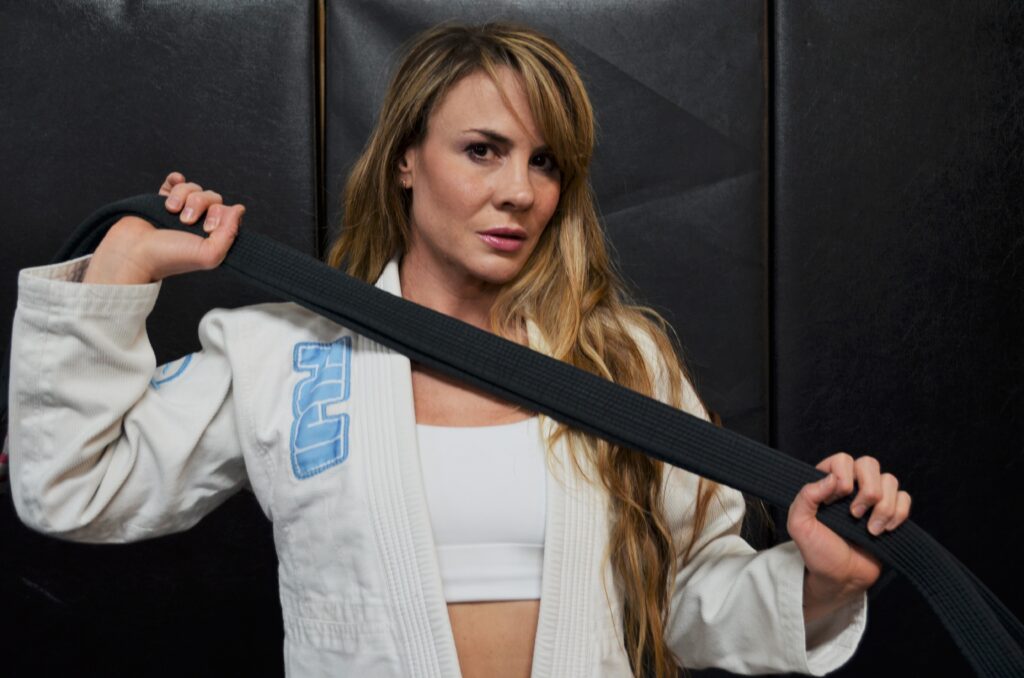
Harassment and Sexual Abuse in BJJ
Sexual abuse and harassment in sports is a reality women have to deal with. Unfortunately, the Brazilian Jiu-Jitsu community is not immune to it.
Most reputable gyms do not tolerate any kind of harassment or discrimination and discourage gender inequality. More and more often, gym members or staff of either gender who violate the rules are swiftly dealt with and invited to leave.
That is not to say the problem has been eradicated. It’s a work in progress.
“We hear more stories of sexual harassment and abuse in sports now because of social media. There are more support groups and women are more vocal about what’s going on. Encouraging women leadership, building awareness and providing community support is the key to end any form of abuse, and for it to not be tolerated anywhere. That is a wonderful change.”
“A big reason why I do what I do is to remove some of the stigma and to hopefully be a female professor that people can come to. I don’t want women going through what I went through.”
Women who have been victimized often mention their lack of knowledge to distinguish what actually is Jiu-Jitsu and what is not. The difference between an accidental “hand in the wrong place” situation while rolling with a guy and subtle abusive behavior can be murky, especially for beginners.
Past trauma victims can also be more vulnerable to predators if they develop the habit of questioning their feelings and dismissing their gut reactions to what’s going on. It’s almost natural for them to engage in this thinking, as they are working through trauma triggers, trying to figure out if what they are experiencing on the mats is a form of PTSD or something bad is actually happening that needs to be reported.
“I want to break down the ancient, debilitating and destructive patriarchal structures that still exist in society. They don’t serve anyone. I feel this is my life’s purpose. Honestly, what better field to promote this kind of change than in a male dominated sport, like Jiu-Jitsu?”
Sophia McDermott
Sophia believes the issue runs deeper than lack of knowledge or past trauma. In her opinion, the root of the problem is the abuse of authority allowed not exclusively in Jiu-Jitsu but in society in general, anywhere archaic patriarchal structures are still upheld.
“At most gyms there’s an authority figure, a male authority figure who’s usually a black belt and the professor in charge. Then there’s the younger girl who is still innocent, impressionable and vulnerable or the shy woman who may be afraid to speak up, afraid to question things so a certain dynamic takes place. The women look up to and unconditionally trust the professor. The professor’s role is to mentor and guide these women in a professional and safe manner.”
“In ego-driven predatory personalities, the dynamic plays out very differently. There is abuse of authority and one thing leads to another, and another, and another. The abuse methodically escalates until someone finds out or the victim speaks out. It’s a slow process of control and conditioning.”
In this toxic scenario, the power is always with the man, and if the woman wants to get better and get promoted, she does what her coach tells her to do. What she doesn’t realize is that instead of empowering her, the abuser is slowly chipping away her confidence, breaking down her boundaries.
“She comes home from training one day thinking that didn’t feel right. But, oh, well, he’s the boss. He knows better than me, he’s my coach. I gotta do what he says. It’s a slow indoctrination and brainwashing. This is the ultimate abuse in power. It is revolting.” Sophia declares.
It takes a lot of courage for victims to speak up.
Sophia believes change is already taking place in Jiu-Jitsu. “Abuse can be stopped with more awareness, which is happening. Also by having more female leaders so there’s absolutely no risk of women being sexually harassed and indoctrinated. There’s something about the totalitarianism of patriarchal leadership where authority becomes control and domination. With more female leaders, there’s a balance of power. The whole structure
of leadership becomes very different.”
Sophia Fit
Around the same time she started Jiu-Jitsu, Sophia launched a personal training business, Sophia Fit. “My progression in BJJ was fast tracked because of my very serious gymnastics background. Honestly, I was a beast of an athlete. And that’s why I was able to hang with the wolf pack. If it weren’t for the mental toughness I developed through gymnastics, I don’t think I would’ve made it. That, and the absolute physical strength, stamina and fitness I had. I say this as a fact, not as boasting. Looking back, I was a super freak. I’m not that athlete anymore.”
Sophia Fit focuses on fitness and nutrition programs designed specifically for women, including building stamina and strength as well as post-pregnancy fitness.
“I remember having my first few clients and not understanding why they couldn’t do the things I could do. I realized it was because I was training so hard. I was trying to get them to do things that were absolutely physically impossible for them without the same insane level of training I imposed on myself. In my mind, the brutality of my training was normal.”
This was a significant awakening for Sophia, to realize how her gymnastics background helped shape and propel her BJJ training. She was concerned that without basic conditioning, BJJ would be too difficult for women in particular. She was concerned they would drop out.
Sophia, once again, paved the way and created a fitness and nutrition program accessible to anyone that would support faster progress in BJJ.
“I was trying to create a smoother, less judgmental path for beginners, especially white and blue belts. Jiu-Jitsu is an amazing journey and I hate to see anyone quit. If you feel that you are progressing a little bit faster, a little bit smoother with some supportive physical exercises, it’s more likely that you will stick with it.”
The Student Becomes the Teacher
After having babies, it became very hard for Sophia to be constantly on the road competing while her family stayed behind on the other side of Australia.
“Something in me was shifting. That hardcore competitor just wasn’t who I was anymore and I made the decision to retire from competing.”
“Teaching comes natural to me. I want to make people feel good in the sport instead of feeling like crap. I was very happy with my decision to retire from competing. I was being true to myself, and it was a swift transition.”
“I think I have taught more Jiu-Jitsu seminars than any woman on the planet. I’ve probably taught as many as the top 10 male professors.”
Motherhood & Jiu-Jitsu
The most under appreciated comeback in sports is that of a woman who has just given birth. A baby can drastically change things for female athletes. They may struggle more with self-identity and postpartum depression.
“I had always prided myself on being this fierce athlete, that’s who I was. And then, all of a sudden, I was a mother and at first I thought, those two don’t go together. Eventually, I realized I could be both if I learned to prioritize.”
Motherhood has allowed Sophia to share her knowledge with ladies who just had babies and want to continue to train.
“As a new mother, breastfeeding was probably the most challenging factor. I would be at competitions constantly looking at the clock. You know, breastfeeding is like a ball and chain, hahaha. “I have to hurry up and breastfeed right now before I get on the mat for my next competition. If I don’t do it, my breasts are going to explode, and it’s really going to hurt.”
“I got very good at hyper focusing my training since I couldn’t train as much. My time on the mat was golden. I needed to make every second count.”
Once the reality of motherhood sets in, many athletes can develop depression. “Perhaps a lot of it is due to the fact that the women don’t actually have any time for themselves or they are not making time for themselves out of guilt. They’ve lost their identity and are raising babies in a very isolated situation. They are probably not around other women enough and don’t have a support network. Maybe their families are overseas or in another state. All of a sudden, they’ve become a mother and everything they did and loved is lost. I believe that is a major contributing factor to post-natal depression.”
“The stories keep coming my way about the woman who has a baby and stops everything she’s doing while the man’s life almost doesn’t change at all. He’s in and out of the house doing what he does, working, training, coming home in the evening, expecting the house to be clean and the meal to be ready while she is sacrificing everything she loves. I hear the same story over and over again.”
“I chat with these ladies and I encourage them to think outside of the box. There are ways you can still train. Bring a nanny to training with you or a co-worker, a friend, a fellow student who is not training that day. Find one hour to train, once or twice a week, and maximize the heck out of that hour.
“I am blessed to have two beautiful girls. They are eight and nine. They’ve grown up seeing me compete, teach and travel quite a lot and yes, they train. They will train at least until they are teenagers. I want to make sure they can defend themselves. That’s super important to me as a mother. I wish every single girl on the planet would learn some basic Jiu-Jitsu self-defense.”
A Sisterhood
Everything that orbits the universe of women’s Jiu-Jitsu is discussed at the lifestyle camps for women, Sophia started running five years ago.
“The number one theme that comes up regularly at my camp is that, for some of the women attending, this is their first time away from their babies. They desperately need to get out but are scared to leave their baby.”
Motherhood is not the only real life situation women are dealing with on the mats. Sometimes it’s a divorce, a significant breakup from a long term partner or something else entirely.
Women come to Jiu-Jitsu for a variety of reasons and the things they crave and need from their practice are very different from the men. “It’s wonderful that I can provide that outlet for them”, Sophia says.
Change Your Perspective
Due to everything that is happening in the world right now and the fact there are still many people who haven’t been able to return to training, the World Champion stresses the importance of changing your perspective. She warns against the dangers of getting attached to social media and comparing your BJJ journey to others.
“Lately, I’ve been noticing many women are feeling left out because of the pandemic. They feel like they are losing ground and not keeping up with the people they see on social media who are back training every day. It’s important to shift your perspective and realize you’re doing Jiu-Jitsu because you love it and not compare your journey to others. Take that pressure off.”
Social media is a tool to share information, stay in touch with family and friends, promote your business. It should not be used to measure the quality of someone’s life.
“People in general get overly attached to what they see on social media. They see their friends getting promoted while they are feeling alone, sitting at home unable to train because their gym is still under lockdown. Don’t let social media dictate your happiness. Stick with your passion. Watch instructional videos, practice some solo drills, do what you can from home.”
“Also, make sure you’re connected with supportive people and support groups like Girls on Top. There is an abundance of women’s groups and support networks online.”
If you’re back training and feel like you don’t have a voice at your gym, Sophia’s advice is to speak up. Go to your professor. Go to a support group. Make yourself heard.
“Speak up. I say this all the time. I say this at my seminars. I say this at my camp. I say it over and over again at my women’s self-defense workshops. If you’re rolling with big strong guys that just want to squash the crap out of you to satisfy their egos or if something is making you feel weird, talk to your professor. If the issue is with your professor, reach out to someone you trust. I’m here to say, that’s your gym, that’s where you train and you don’t have to force yourself to train with people who only make you feel uncomfortable. If it doesn’t feel right, it most likely isn’t. Don’t just take it. Say no. It’s your body. It’s your job to protect it. It’s your journey.”
You can say no and do it without justification and without apology. Stand your ground.
A successful journey is not possible without those who picked us up and supported us along the way. “I would like to thank everyone who has been in my corner, especially my sponsor, Fuji sports. They believed in me from the start and have been my sponsor for a long time. Fuji makes absolutely fabulous gis for female athletes and is a company that has been essential in putting women on the map in BJJ.
Follow Sophia on IG:
sophiamcdermottbjj
BEHIND THE SCENES
Our power-trio production team had a blast shooting this month’s cover with the beautiful Sophia McDermott. Check out the behind-the-scenes photos!
Art Direction: Evelyn Sutton
Photography: Lindsay Conley
Hair & Makeup: Vhilena Nelson

Our printed magazine is full of extraordinary women with extraordinary stories, get your printed copy via mail today >



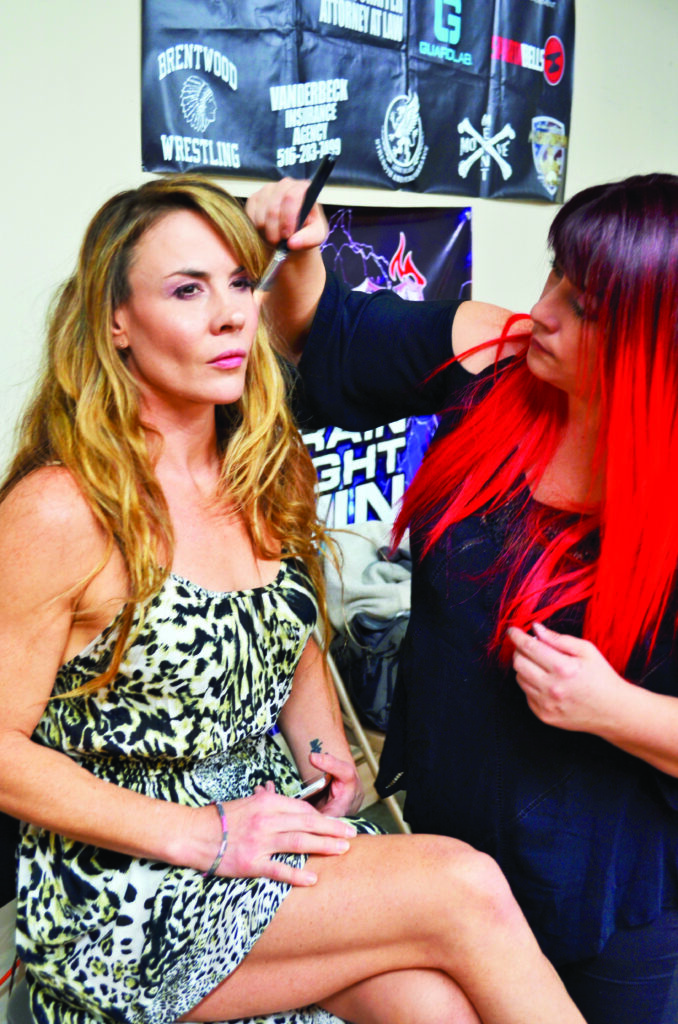
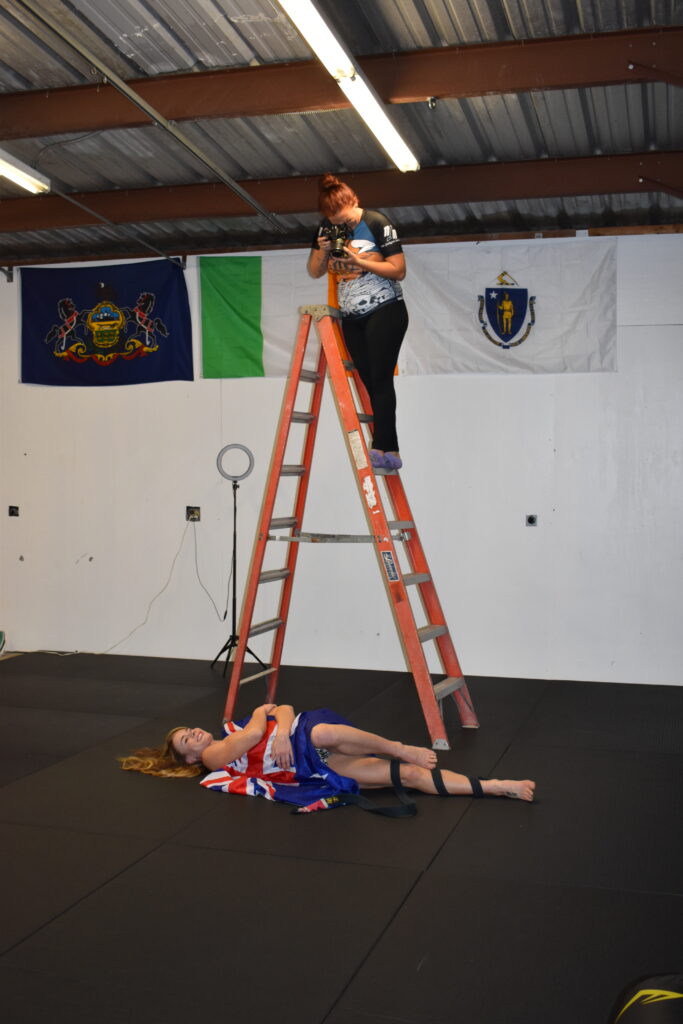
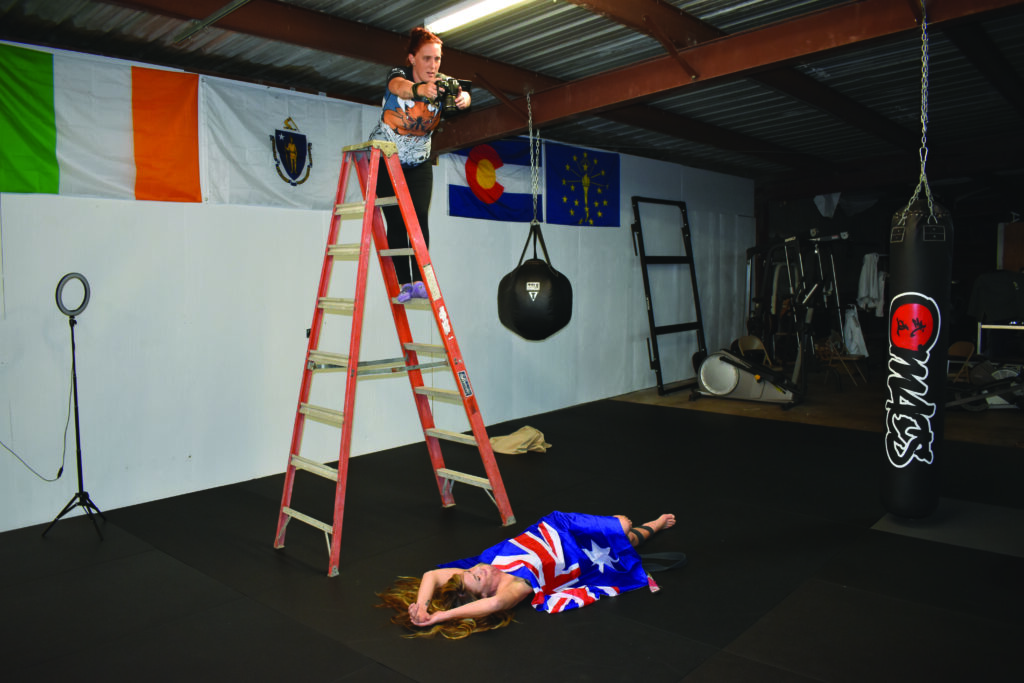
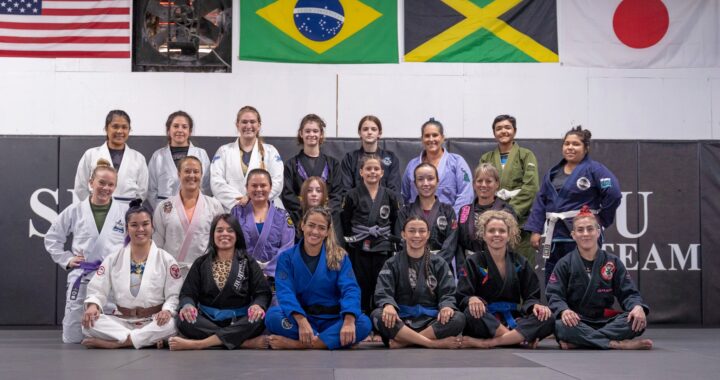 The Jiujiteira Sisterhood
The Jiujiteira Sisterhood  ADGS Rome: Jiujiteiras Shine in the Land of the Colosseum
ADGS Rome: Jiujiteiras Shine in the Land of the Colosseum 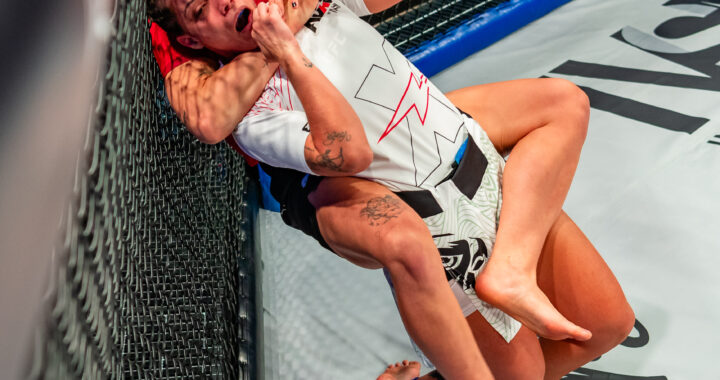 Ffion Davies: Unmatched Dominance at ADXC2
Ffion Davies: Unmatched Dominance at ADXC2 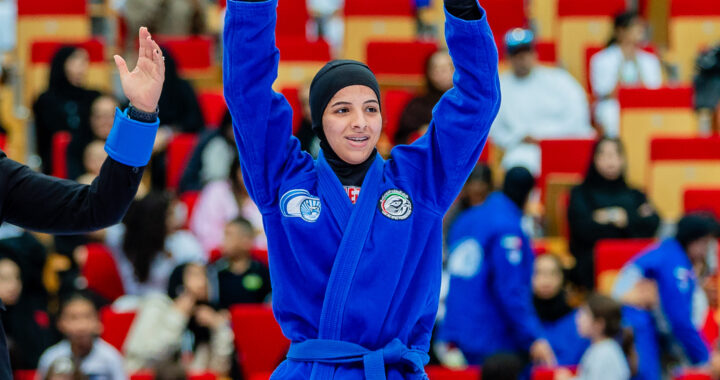 Winners of Mother of the Nation Jiu-Jitsu Cup are celebrated in Abu-Dhabi
Winners of Mother of the Nation Jiu-Jitsu Cup are celebrated in Abu-Dhabi 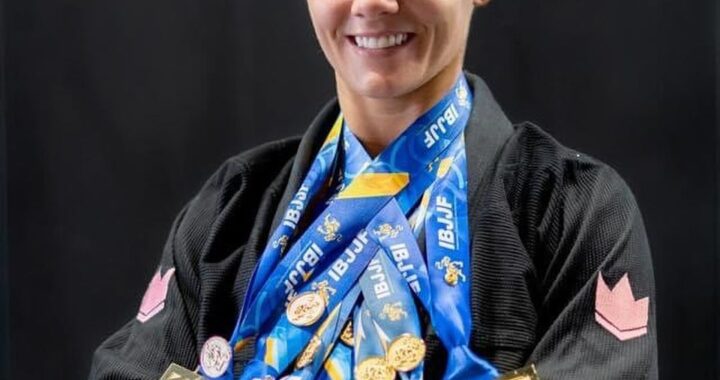 Maggie Grindatti Hangs Up the Gi: A Transition from BJJ Athlete to Fitness Coach
Maggie Grindatti Hangs Up the Gi: A Transition from BJJ Athlete to Fitness Coach 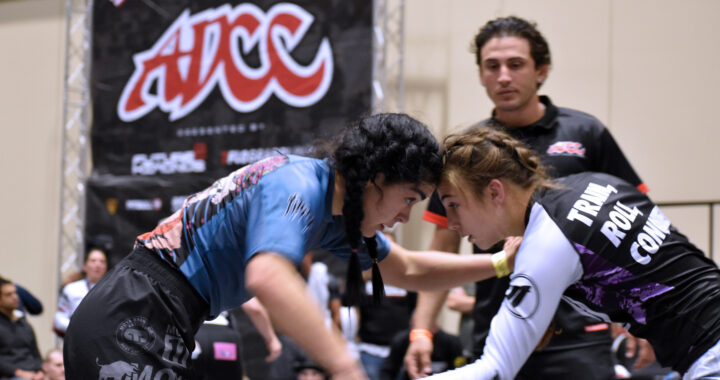 Jiujiteiras deliver intense battles and remarkable performances at ADCC Orlando Open
Jiujiteiras deliver intense battles and remarkable performances at ADCC Orlando Open 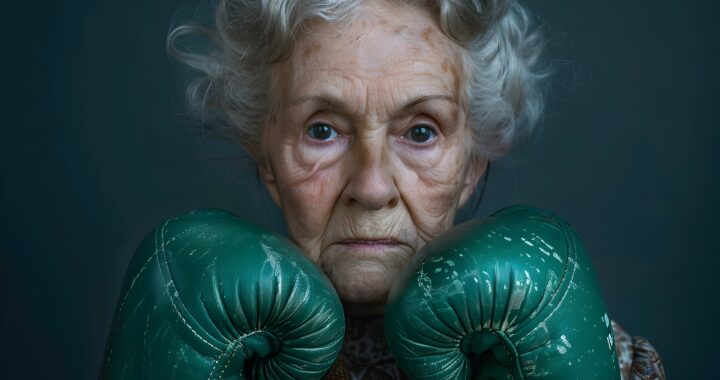 Father Time is Undefeated
Father Time is Undefeated 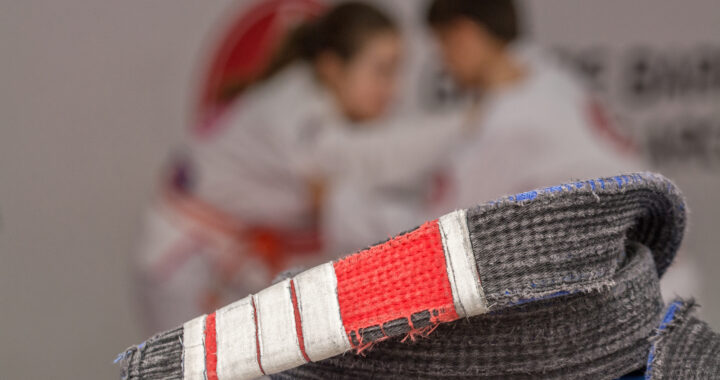 Advice in the Ranks- From White to Black
Advice in the Ranks- From White to Black